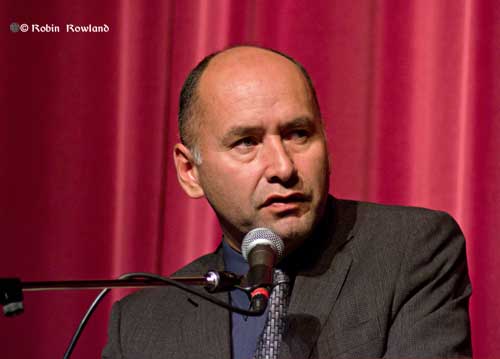Energy Environment
British Columbia’s coastal First
Nations are calling for a complete overhaul of the Northern Gateway
Joint Review process and have a filed motion that calls for the hearings, scheduled to begin
January 10, be adjourned until the proceedings are reformed.
Motions were filed between
October 28 and November 14, with the JRP by the Coastal First
Nations, an alliance of coastal aboriginal nations, the Haisla First
Nation in Kitimat, the Gitxaala First Nation in Kitkatla and a coalition of
environmental groups known as the Sustainability Coalition that
includes the Living Oceans Society, Raincoast Conservation
Foundation, ForestEthics.
A number of reasons emerged in
recent weeks that led to the motions.
The First Nations and environmental
groups spent the summer studying the hundreds of thousands of pages of
studies, plans and other documents filed by Enbridge and its
consulting firms with the Joint Review Panel.
The Haisla First Nation, Gitxaala
First Nation, the Coastal First Nations coalition and the
Sustainability Coalition then filed a series of questions and
requests for clarification with Enbridge based on those documents.
It soon became clear that there was no time for Enbridge or its
consultants to respond to the questions before the hearings are
scheduled to begin on January 10, 2012.
The Joint Review Panel also recently
rejected a request from the Haisla that the First Nations’ evidence
and oral comments be heard at the same time.
Art Sterritt, executive director of Coastal First Nations
addresses the
Solidarity Gathering of Nations at Kitamaat Village, May
2010.
(Robin Rowland/Northwest Coast Energy News)
 In September, Enbridge CEO Pat
In September, Enbridge CEO Pat
Daniel did meet with the Coast First Nations and according to Art
Sterritt, executive director, asked for a “fresh start” in the
company’s relationship with First Nations. Sterritt said that Daniel
admitted to the meeting that Enbridge had not listened.
Sterritt said he asked Daniel to
support Coastal First Nations request for a delay and overhaul of the
Joint Review Process. Daniel promised to get back to them. There was
no hints of any other deal in the offing as reported on Tuesday,
November 23 by The Globe and Mail and other media.Gateway pipeline,
contradicting
media reports that a deal with Enbridge was in the offing.
In
a news release issued Wednesday, Nov. 23, Sterritt, said:
The Coastal First Nations categorically oppose Enbridge’s
Northern Gateway Project ….we unequivocally maintain our ban
on oil tankers on the coast.”
It was Mr. Daniels, of
Enbridge, who spoke of wanting a fresh start with the Coastal First
Nation.
Sterritt, on behalf of the board, told Daniels that a
fresh start from the Coastal First Nations perspective meant having
Enbridge ask the Joint Review Panel (JRP) to stand down. “The
Joint Review Process is seen by the Coastal First Nations not as
objective, rather as a process that advances the Enbridge
Project.
Subsequently the Coastal First Nations has been
informed that Enbridge is not prepared to ask the JRP to stand down
or reveal who the other proponents are, he said.
In August of
2009, Enbridge stated that the proposed project would not go ahead if
First Nations communities opposed it, said Sterritt. “None of
our communities support the project. Nor do any First Nations along
the pipeline route.” “Why would we support a proposal that
would put our rivers, oceans and lifesource at risk?” Sterritt
said. “It’s time Pat Daniels and Enbridge take the correct
action and give us the fresh start they promised. It’s time to shut
down the Joint Review Process and the Northern Gateway project.”
Sterritt told Northwest Coast Energy News that they had heard
nothing from Daniel for two to three weeks and had to contact his
office, and then were told that Enbridge could not agree to a delay
in the Joint Review Process nor could it reveal, for confidentiality
reasons, who the other “proponents” are.
The first motion to the JRP, filed by the Haisla First Nation on
October 28, concentrates on the long list of questions and
clarifications, calling for Northern Gateway to provide a “full and
adequate response” to their concerns by a fixed date and until
that happens
an amendment to the Hearing Order that sets new and reasonable
deadlines for information requests and written intervenor evidence,
oral testimony and final hearings once the Northern Gateway has
provided all the information required….
The other motions are similar. The Gitxaala motion also calls
for release of studies that have not yet been filed on the Northern
Gateway site, asking that “Northern Gateway provide copies of
pending studies referenced in its various responses to information
requests from the Gitxaala and the Government of Canada.”
The part of the motion looks like the First Nations want to be able to forgo the often overly formal National Energy Board legal process to allow both presentation of evidence and oral comments from First Nations members, as the Haisla requested.
The flexibility in deadlines is also needed because, so far, Enbridge has not clarified its announced plans for a possible natural gas pipeline to the west coast and how that might affect the Northern Gateway.
(See Editorial, Oct. 7, Lawyers have a lot to be thankful for )
The Joint Review Panel did extend the deadline for information
requests for the four groups filing the motion notwithstanding the
previous deadline of November 3.
Other intervenors have until November 30 to file their own
comments. Northern Gateway can respond by filing comments up until
December 9, and the four that filed the original motions can respond
to those comments by Dec 20.
All other written evidence must filed by December 22, in
compliance with the original order.
Given the Christmas and New Year’s holiday, any decision to
postpone the Joint Review hearings will have to come quite close to
the January 10 opening date.
Enbridge had no comment on the notice of motion or its discussions with the
group, spokesman Paul Stanway told Reuters:”We
remain committed to the consultation process and to the regulatory
review. We’re talking to a number of first nations and we will continue
to talk to them.”
JRP letter summarizing motion files by Haisla Nation, Coastal First Nations, Gitxaala Nation and the Sustainibility Coalition (pdf)
Haisla Information request(pdf)
Haisla notice of motion (pdf)


 In September, Enbridge CEO Pat
In September, Enbridge CEO Pat